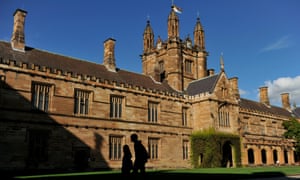Extract from The Guardian
The government’s veto on research grants is political interference on an unprecedented modern scale
A
revelatory Senate estimates hearing has exposed – in his former position
as education minister – Senator Simon Birmingham exercised a personal
ministerial veto over grants approved by the Australian Research Council
to eleven research projects, done secretly and beyond public view. The funding denied totalled $4m.
How curious that only humanities projects were Birmingham’s target: no research in other fields of study, such as science, were blocked.
The veto has been rightly identified as political interference, on an unprecedented modern scale. The ARC is an independent body;
a stringent Act of parliament governs its activities. Outraged
spokespeople from the Australian Academy of Humanities have condemned
the government for undermining a grant process “highly respected around
the world for its rigour and integrity … only exceptional applications
make it through the process”. The vice-chancellor of UNSW condemned
an “unjustified and unexplained decision to solely deny funding for
research that contributes to scholarship in arts and humanities” as
“deeply troubling”.How curious that only humanities projects were Birmingham’s target: no research in other fields of study, such as science, were blocked.
Birmingham defended his overreach in a tweet. “I‘m pretty sure most Australian taxpayers preferred their funding to be used for research other than spending $223,000 on projects like ‘Post-orientalist arts of the Strait of Gibraltar’.”
Yet it’s the minister himself whose need for this particular research is a national priority. You see, only a couple of weeks ago, Simon Birmingham was one of the hands raised to support far-right senator Pauline Hanson’s senate motion pleading – among other things – for the defence of western civilisation. He’s been one of the government’s most ardent advocates for installing the presence of a “Ramsay Centre for Western Civilisation” on Australian campuses.
"That’s the thing with knowledge for knowledge’s sake ... you never know where established facts will come in handy"
The value of this specific and particular research is what insights it gives to the distinctiveness of the modern western civilisation for which the minister spruiks. Gibraltar was once a geographical passageway between continental Europe and Africa and a place that shared dual language and cultural influences from Moorish and Judeo-Christian societies. From 1492 on, after the Spanish defeated the last Muslim government north of the straits, Gilbraltar’s role was affirmed by the victors as a barrier between cultures. If you’re interested in what precise features distinguish “western civilisation” from its neighbours, “post-orientalist arts of the Strait of Gibraltar” would be a most useful place to start.
If only Simon Birmingham had some available research with which he could furnish his passions with detail. If only arts graduates, such as myself, were never trained by expert university researchers how to locate, analyse and compare a politician’s dissembling nonsense of last week with their fatuous nonsense of today.
That’s the thing with knowledge for knowledge’s sake – also known as “the reason we invented the university” – you never know where established facts will come in handy, and yet they always, always do. How fabulously interesting Simon Birmingham’s quote from this June on the Ramsay Centre issue looks now: “I hope [universities] stare down the fear and negativity …” he has said, “and recognise that academic freedom and free academic inquiry should extend across all disciplines.”
He may wish to repeat this argument to his colleague, the Liberals’ new education minister, Dan Tehan, who has been “helping” Birmingham dig himself further down into the muddy soil of rank hypocrisy.
Tehan’s announced that university funding must now meet an “national interest test”, seemingly unaware that grant proposals already pass a “national benefit test” before they are awarded. He’s defended the plan to impose this superfluous double burden on a process that wrests research direction from independent, academic assessment to the ideological whims of a politicised, individual non-expert as “common sense”. Australian Nobel laureate, professor Peter Doherty, has already condemned it. “Research has to be in the national interest? What does that mean? If it’s not in the interests of the coal and gas industry it’s not in the national interest?” he tweeted.
It’s a tender solidarity exhibited here by a man of science to the humanities community. The habit of scientists to offend the “common sense” standards of their times with research has historically proven quite dangerous. Rhazes, the medical pioneer of ninth century Baghdad, was beaten blind with his own compendium by a priest. The humanist Michael Servetus, a 16th century physician credited with discovering pulmonary circulation, was tortured and burned along with his bookson the shores of Lake Geneva at the personal behest of John Calvin. In the 17th century, Galileo spent his last years under house arrest, forced by the church to recant the heretical belief that the earth orbited the sun.
These were the precise experiences abjured by the proponents of the 18th century Enlightenment – a historical movement defined by its spirit of unrestricted inquiry, freedom and liberalism, and about which the federal members of our Liberal party really ought to do some reading.
The Labor party have condemned the behaviour of Tehan, Birmingham and the rest of the Liberal-National government as “knuckle-dragging philistines” for their academic interference, which was incredibly sweet of them, given the unambiguously hostile, vindictive, ideologically-censorious authoritarianism manifested in the government’s behaviour. We are fortunate, indeed, as a society that some useful research has survived that may just yet inform us where this kind of thing ends.
• Van Badham is a Guardian Australia columnist

No comments:
Post a Comment